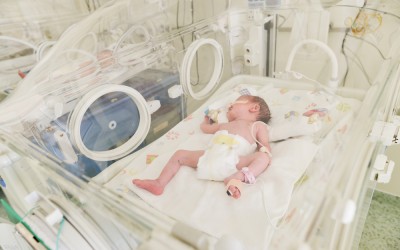
Not Just Physical: the Psychological Burden of Preeclampsia and HELLP Syndrome
 Stress caused by a traumatic pregnancy and delivery can often override the ability to emotionally cope, leading to psychiatric complications such as post-traumatic stress disorder (PTSD) and postpartum mood disorders (PPMD) like depression (PPD) and anxiety (PPA). Suffering a serious illness, combined with the unexpected (whether a caesarean section, birth of a premature child, infant loss or even an emergency medical situation) is a heavy burden to bear both physically and psychologically.
Stress caused by a traumatic pregnancy and delivery can often override the ability to emotionally cope, leading to psychiatric complications such as post-traumatic stress disorder (PTSD) and postpartum mood disorders (PPMD) like depression (PPD) and anxiety (PPA). Suffering a serious illness, combined with the unexpected (whether a caesarean section, birth of a premature child, infant loss or even an emergency medical situation) is a heavy burden to bear both physically and psychologically.
Several peer-reviewed research studies, including studies initiated by the Preeclampsia Foundation, suggest that women who have endured traumatic pregnancies such as severe preeclampsia, eclampsia and HELLP syndrome have a higher incidence of PTSD and PPMD than women without these complications. More research is needed to help move this information to clinical practice. Anecdotally, we know that enough of our survivors are psychologically affected that we offer these recommendations based on general trauma recovery practices.
Be patient. Recovery is an ongoing process with a different pace for everybody. However, if you are unable to care for your children or basic responsibilities of life, you should seek professional help. Coping mechanisms that may work for you may not work for your spouse or other family members, and vice versa. Healing doesn't mean you will have no pain or bad feelings when thinking about the pregnancy experience, but that you can develop more confidence to be able to cope with your memories and feelings.
Seek professional help. Look for a psychological health care provider who specializes in perinatal complications and loss. A professional can help you understand and process your experience and find coping and healing techniques that work for you. Whether you are dealing with the loss of a child, the loss of your health or the loss of your “sought after” pregnancy experience, mental health professionals can help you recover normal functioning in life skills.
Understand your pregnancy experience. Communicate with health care providers to understand the medical and emotional aspects of the experience. If necessary, ask to be referred to a qualified high-risk specialist who can review your records. Plus, the Preeclampsia Foundation has great online and print health information resources for you and your family.
Stay connected. Research shows that good social support is vital to recovery. Stay connected in particular with your family and friends. You might also consider joining a support community, whether it is joining the Preeclampsia Foundation's Facebook community (https://www.facebook.com/groups/pfcommunityconnection) or contacting your local health department or hospital services for a grief support group. Also, don’t forget that if you are in a relationship or married, severe trauma can be challenging to both partners, so be proactive to strengthen that vital relationship.
Find a great hobby. Not only does it boost your self-esteem, you will connect with people who share interests that are outside of your pregnancy experience. Find a subject about which you are knowledgeable and passionate. For instance, many women find comfort in the life-affirming aspects of nature: go for walks, start a gardening project, or volunteer at a local park or animal sanctuary.
Keep a journal. By writing things down, you can temporarily dissociate yourself from the world and start to chart your road to recovery. Write in it every day, even if it is only to state three good things that have happened that day.
Set goals. Start by setting small goals and commit to doing it. Make a list of all the things you used to enjoy and revisit them. Decide which one you are going to focus on and make a small start. Someone close to you can help you be accountable for your progress… or even join you to complete those goals!
Access our birth trauma resources
For more information about PTSD or PPD research, citations for these recommendations, or to talk with a member of our team about your experience, please fill out the support form below. We look forward ot hearing your story.
WE LOVE TO HEAR FROM YOU
Related Articles

Doulas can help bridge the gap for any mom, but especially those most vulnerable to maternal illness and death.

Stories of our brave women and families who have been affected by preeclampsia and HELLP syndrome. Please note that due to a technical issue, we are currently fixing the images on this page.

What is Preeclampsia? Preeclampsia is a hypertensive disorder that occurs only during pregnancy and the postpartum period and affects both the mother and the unborn baby. Affecting at least...

Birth Trauma Resources Between 25 and 34 percent of women report that their births were traumatic. A traumatic birth experience is defined by circumstances in which the individual patient bel...

Meghan Markle is opening up about her experience with postpartum preeclampsia in the debut episode of her new podcast, Confessions of a Female Founder. In the episode with her first guest and clo...
1732072344.png)
While the Preeclampsia Foundation has been championing patient advocacy and representation for all families affected by hypertension in pregnancy throughout our 25 year history, we recognized the uniq...

For many members of the preeclampsia, HELLP syndrome, and eclampsia community, the neonatal intensive care unit (NICU) is a life-changing part of their pregnancy and birth experience. Parents from our...

Resultados de varios estudios apoyan la hipótesis de que el estrés causado por un embarazo y parto traumáticos puede en muchas ocasiones anular la habilidad de salir adelante emoc...

As an advocate who served on the planning committee for the Foundation’s Chicago Promise Walk and 5K Run for numerous years and currently serves on the Patient Advisory Council, Jasmine Mago is...

